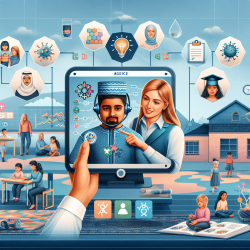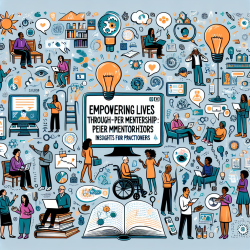Introduction
Cyberbullying has emerged as a significant public health concern, particularly among adolescents who are increasingly immersed in digital communication. According to the research article "Current perspectives: the impact of cyberbullying on adolescent health" by Charisse L. Nixon, cyberbullying can have profound effects on the mental and physical health of adolescents. This blog aims to help practitioners improve their skills by implementing research findings and encouraging further exploration into this critical issue.
Key Findings from the Research
The research highlights several key outcomes related to cyberbullying and adolescent health:
- Cyberbullying victims often experience increased levels of depression, anxiety, loneliness, and suicidal ideation.
- Perpetrators of cyberbullying are more likely to engage in substance use, aggression, and delinquent behaviors.
- Cyberbullying can lead to somatic symptoms such as headaches, sleep disturbances, and stomachaches.
- Both victims and perpetrators of cyberbullying report poorer relationships with peers and caregivers, leading to increased social isolation.
Implications for Practitioners
For practitioners working with adolescents, understanding the impact of cyberbullying is crucial for developing effective prevention and intervention strategies. Here are some data-driven approaches that can be implemented:
- Screening and Assessment: Regular screening for cyberbullying involvement should be integrated into routine health assessments for adolescents. This can help identify those at risk and provide timely support.
- Education and Awareness: Educators and healthcare providers should be trained to recognize the signs of cyberbullying and its effects on adolescent health. Awareness programs can empower adolescents to speak up and seek help.
- Family Involvement: Encouraging open communication between adolescents and their caregivers can help mitigate the effects of cyberbullying. Family support is a critical protective factor against the negative impacts of cyberbullying.
- Promoting Empathy and Social Skills: Programs aimed at enhancing empathy and social skills can reduce the likelihood of adolescents engaging in or being affected by cyberbullying.
Encouraging Further Research
While the current research provides valuable insights, there is a need for more longitudinal studies to understand the long-term effects of cyberbullying on adolescent health. Practitioners are encouraged to stay informed about the latest research and contribute to the growing body of knowledge on this topic.
Conclusion
Cyberbullying is a complex issue that requires a multifaceted approach to address its impact on adolescent health. By utilizing data-driven strategies and fostering a supportive environment, practitioners can play a vital role in mitigating the harmful effects of cyberbullying and promoting the well-being of adolescents.
To read the original research paper, please follow this link: Current perspectives: the impact of cyberbullying on adolescent health.










